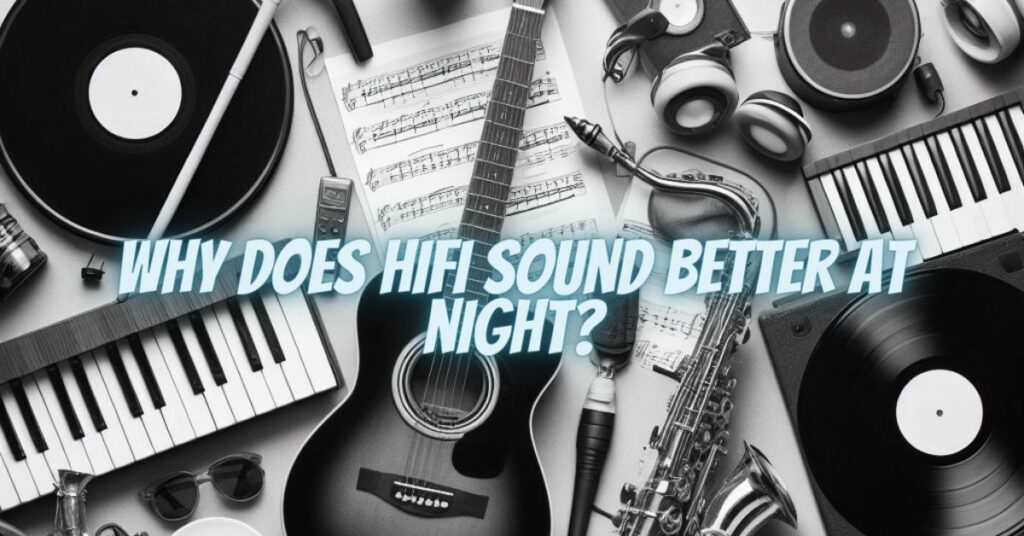Many people find that their HiFi system sounds better at night. This is a well-documented phenomenon, with many audiophiles and music lovers reporting that they experience a more immersive and enjoyable listening experience after dark.
There are a number of possible reasons for this. One of the most obvious is that there is generally less ambient noise at night. During the day, our homes and neighborhoods are filled with all sorts of sounds, from traffic to construction to people talking. This background noise can mask the finer details of our music, making it sound less clear and vibrant.
At night, however, the world is much quieter. This allows us to focus more fully on our music and appreciate all of the nuances that we might miss during the day.
Another reason why HiFi may sound better at night is because we are more relaxed and focused after dark. During the day, we are often multitasking and juggling a variety of tasks. This can make it difficult to truly relax and immerse ourselves in our music.
At night, on the other hand, we are more likely to have some free time to relax and unwind. This can make us more receptive to the emotional and sonic impact of our music.
Finally, some people believe that the hormone melatonin, which is released by the body at night, may play a role in our enhanced listening experience. Melatonin is thought to increase our sensitivity to sound, making us more aware of the subtle details of our music.
Here is a more comprehensive and in-depth look at the various factors that may contribute to the improved sound quality of HiFi systems at night:
Reduced ambient noise
As mentioned above, one of the main reasons why HiFi systems sound better at night is because there is generally less ambient noise. This is especially true in urban areas, where traffic noise can be a major distraction.
At night, the traffic noise subsides and other ambient noise sources, such as construction work and people talking, are also reduced. This allows us to focus more fully on our music and appreciate all of the nuances that we might miss during the day.
Diminished sensory input
Another factor that may contribute to the improved sound quality of HiFi systems at night is the diminished sensory input. During the day, we are constantly bombarded with visual and auditory stimuli. This can be overwhelming and can make it difficult to focus on a single task, such as listening to music.
At night, however, the sensory input is reduced. This allows us to relax and focus more closely on our music. We can also close our eyes and block out any remaining visual distractions.
Emotional connection
Many people also find that they have a stronger emotional connection to their music at night. This is likely due to the fact that we are more relaxed and focused in the evening hours. We may also be more likely to listen to music that we enjoy and that has a personal meaning to us.
When we are emotionally connected to our music, we are more likely to appreciate the finer details and nuances. We are also more likely to have a more immersive and enjoyable listening experience.
Psychological factors
Some people believe that there are certain psychological factors that can also contribute to the improved sound quality of HiFi systems at night. For example, some people believe that we are more likely to perceive positive sounds and stimuli at night. This is known as the “positive-affect night amplification effect.”
Others believe that the darkness of night can create a more immersive and engaging listening environment. When we are surrounded by darkness, we are less likely to be distracted by visual stimuli and can focus more fully on our music.
The hormone melatonin
Finally, some people believe that the hormone melatonin may also play a role in our enhanced listening experience at night. Melatonin is released by the body at night to help regulate sleep. It is also thought to increase our sensitivity to sound.
Some studies have shown that melatonin can improve our ability to detect and discriminate between different sounds. This suggests that melatonin may play a role in our enhanced ability to appreciate the nuances of music at night.
There are a number of possible reasons why HiFi systems sound better at night. These include reduced ambient noise, diminished sensory input, emotional connection, psychological factors, and the hormone melatonin.
Of course, the individual experience will vary from person to person. Some people may find that their HiFi system sounds the same regardless of the time of day. Others may find that the difference in sound quality is more pronounced at night.
If you are interested in experiencing the best possible sound quality from your HiFi system, I encourage you to give it a listen at night. You may be surprised at how much better your music sounds.


